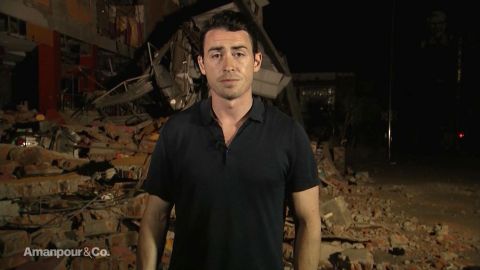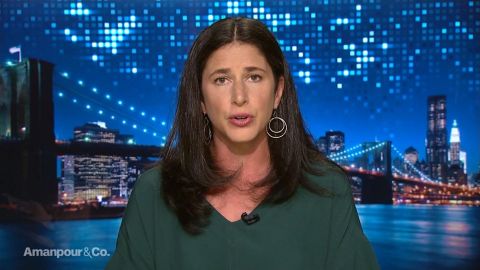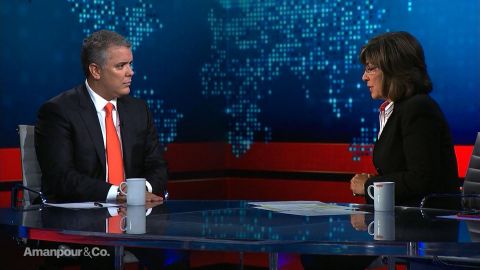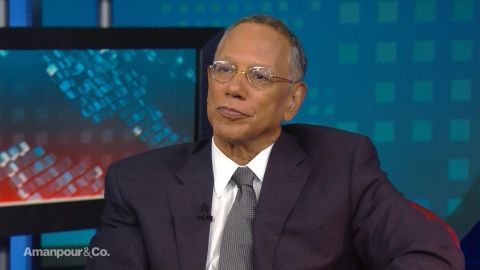Read Transcript EXPAND
WALTER ISAACSON, CEO, CNN: Dean, welcome to the show.
DEAN BAQUET, EDITOR, NEW YORK TIMES: Thank you, it’s good to be here.
ISAACSON: You grew up in New Orleans in a distinguished, large, you know, black, Creole family. What was that like in terms of your concepts of race
and class?
BAQUET: Yes, you know, it’s interesting. I – my whole world as a kid was – was black New Orleans. I mean I went to a – I grew up in a black neighborhood in Shermay (ph). I went to a black Catholic grammar school, I went to a black Catholic high school. In fact the only – the only people who weren’t black that we were exposed to were nuns and priests in grammar school and high school. My first experience in a – sort of a larger world in terms of race was going away to college.
ISAACSON: I think you though had a great, great grandfather, famous musician George Baquet and Achille Baquet’s father, well (ph) Achille even passed for white when he went to Los Angeles.
BAQUET: Achille Baquet actually played in Jimmy Durante’s jazz band. If you go online, there’s a picture of him in the band.
ISAACSON: Right.
BAQUET: And he passed for white. That was – that was pretty common.
ISAACSON: It was called en passant back then.
BAQUET: That’s right, that’s right.
ISAACSON: He dropped out of college to do it (ph), went to the (inaudible) where I worked as well with you. And what did you learn there?
BAQUET: I learned parts of the city I didn’t know before. I learned – I mean I made a lot of mistakes as a journalist. I learned how to – I learned how to be truthful. I got exposed to cops, I got exposed to a whole different world than I had grown up in.
ISAACSON: Donald Trump slams you almost daily, the failing New York Times, the fake news. Because Trump is so different, does that affect how you have to cover him?
BAQUET: Yes. You have – you have – there was a script to covering a president. And the script was if the president said something, that was news. He was likely to do it or to try to do it. This is a very different president, first off, you know, he obfuscates, he used a different word, he’s not always truthful, he doesn’t always carry out what he says, he shoots from the hip. There’s tremendous turmoil in this administration. We had a debate during the campaign whether or not to say he – to use the word lie, which I decided to do, and I can’t imagine another executive editor of the New York Times ever had to decide whether or not to call a nominee and possible president of the United States a liar on the front page. I think that was a – I mean that just shows how much he’s changed the game.
ISAACSON: Have you ever talked to Trump? Has he ever called you?
BAQUET: He has called me, he’s called me. I’m reluctant to – he’s called me to complain, and I’ve listened to him. And he has been to the New York Times a couple times.
ISAACSON: But at times, like when the publisher of the New York Times has a meeting with him, you decline to go because you don’t feel like attending off the record meetings?
BAQUET: I don’t think the executive editor is supposed to be in off the record meetings with heads of state. That’s a personal issue. When I was a Washington bureau chief, I never met Barack Obama, because I didn’t think the Washington bureau chief should talk off the record to the president. My view is whatever the president wants to say, my readers should – should know. So I felt – I mean a lot of my staff disagrees with me, by the way. I think the publisher is a different job, but I wouldn’t meet off the record with the president.
ISAACSON: Are you saying that the Times is a little too liberal?
BAQUET: You know, it’s funny, I actually don’t. You looked startled when I said that. The editorial page is liberal. The New York Times is made up of a lot of stuff. I would make the case that our business section carries with it – the fact that we have a business section carries with it the view, the obvious view that capitalism is an important part of the life of the country. I mean a lot of people would say having a business section and covering Wall Street and covering winners and losers is not a very liberal thing to do. I actually don’t.
ISAACSON: We’re in the middle of almost a category five swirl in the MeToo movement, and this latest wave of it was pretty much started when the New York Times did – began doing its stories and then eventually culminated with the Harvey Weinstein story. Did you have trouble — did you get a lot of pressure on the Harvey Weinstein story? Are there two sides to that, or was it just gung-ho?
BAQUET: You know, Harvey Weinstein, who I had met once or twice, he said – – nobody ever says he was one of our biggest advertisers. When we started working on the story — and I was deeply involved in the story — when he called and he wanted — come back to earlier (ph) (inaudible), he wanted to talk off the record. And — and I said we don’t — I don’t talk off the record with — first off, I don’t talk to people that are the subjects of stories without a reporter in the room. That’s the first thing. The second thing, I don’t talk off the record to people who are the subjects of investigative stories. He was upset, he lobbied a lot of people but — but — and it was interesting, but there was never any — any thought about not pursuing the story.
ISAACSON: But you had to pause before you published it until you finally felt you had nailed it. What happened then?
BAQUET: The moment — the moment — we had a really debate in the newsroom. We heard — just as we were nearing the end of it, we heard that the New Yorker was working on a story.
ISAACSON: Here’s (ph) Ronan Farrow and —
BAQUET: No, it was Ronan alone (ph) that was before Jane Mayer (ph) joined him. And we got anxious. I don’t like getting beat. I called the reporters and their editor in and I said we got to do this now. They argues — they said look, I know we have the story, but we think it’s important to name a couple of movie stars in the story. We had movie stars, but they were off the record. I said, wrongly, that’s ridiculous, let’s just do the story. Rebecca Corbett, who was the editor, said no, if we name stars it will have much bigger impact. Me, being somebody who doesn’t go to a lot of movies, didn’t get that. I said I’m not going to get beat on this story. I kept pushing. And then there was this wonderful moment where one of the reporters walked in, Jodi Kantor, tears in her eyes as I remember it, and said that Ashley Judd had agreed to be on the record. And they were right. The reason these stories had so much impact, I think — and this may be unfortunate, but I think it’s true — is because these are people who people could identify with. Ashley Judd, Gwyneth Paltrow. I think the readers read those names and they resonated — unfortunately, but they did resonate a lot more than the women, for instance, who were in the stories we did about Donald Trump.
ISAACSON: Did you — was there ever a point you said to yourself this is a big deal in America, sexual harassment, aggression, let’s make this our big
—
BAQUET: Yes, but I didn’t know it was going to be this. I had assigned — I had remembered a case in which Bill O’Reilly had been accused of something years and years before and nothing had come of it. So after the election, after we had done the Trump stories about Trump and the allegations of — of harassment I assigned a couple of reporters to go back and look at that case. And it ended — it led to the stories that led to Bill O’Reilly being forced out. And then me and other editors said we need to put together a team, this is a real issue I the country. And I said find out if there are other cases like this, and Harvey Weinstein ended up coming from reporters that way. I did not know this was going to be the moment that it was in the life of the country. I had no — I — I had no idea.
ISAACSON: And (ph) every now and then you have to say OK, I’m not going to publish something. I think you did that with Deborah Ramirez, who might be
—
BAQUET: Yes. Yes.
ISAACSON: — the third person to accuse Brett Kavanaugh.
BAQUET: Yes. Yes. Yes. Yes. In that case, we chose not to publish — partly (ph) we didn’t have an interview with her and The New Yorker did. I mean, that was the main reason. All we had — if you didn’t have her — all we had were people who knew her who either couldn’t quite support her account or disagreed with certain aspects of her account. So I felt like I was sitting there with paragraphs 30 through 40 and not paragraphs one through 29, which would have been the interview with her.
ISAACSON: You’ve had to deal with it in your own newsroom —
BAQUET: Yes.
ISAACSON: — because reporting on it’s happened. How did you decide not to fire Glenn Thrush?
BAQUET: It was a really difficult decision. I — first off, I assigned someone who works for me to look into all the allegations. I put together a diverse team of women and men and we sat down in my office for two — in an office next to mine for two days and we debated it. And we debated — the questions were — we did believe the women. That wasn’t the issue. The question was was this enough to drum him out of the profession forever. It had not happened while he was working at The New York Times, it had not happened in our news room. His behavior was awful but in the end the group — and I — actually, even though it’s my decision, I wanted — I did not want this to be one I made alone. The group decided to give him another chance. We took him off the beat that he always dreamed of. Which I think in journalism is no longer the White House reporter. In journalism, people get that that’s a big punishment. This guy, from the time he was growing up in Long Island wanted to cover the White House. We took it away from him. And we did some other things, we suspended him, and then we brought him back. And I get that there are people who disagree with that and it was really hard, but I – maybe it’s – maybe it’s what’s left in my Catholic upbringing, I still think people deserve another chance sometimes and I thought he did.
ISAACSON: The op-ed page doesn’t fall under you.
BAQUET: Right.
ISAACSON: It did publish something from anonymous, a person in the Trump administration –
(CROSS TALK)
BAQUET: And now I’m going to say who it is. No, I’m not going to.
ISAACSON: Well that’s a question I have. Did you sick (ph) reporters and say to your reporters I want you to find out who it is even though your own
op-ed page promised anonymity?
BAQUET: First off, I didn’t – I don’t – to this day I’m saying this so people can stop grabbing me on the subway, I don’t know who it is. I
didn’t know –
ISAACSON: But then if you did, you’d publish it, right?
BAQUET: If I did, I’d publish it. But here – but – but I also want to make one thing clear, I did not assign reporters to go nuts to find who anonymous was. First off, I didn’t think it was that important. It wasn’t out of the blue, it was consistent with what people had said in Bob Woodward’s book. Finally boy (ph) nothing’s trickier than outing an anonymous source. So it’s not like I said let’s put together and a team and of all the things in the world we can investigate, let’s do this.
ISAACSON: Was the op-ed page then right to publish anonymous?
BAQUET: I would have published it. Whoever wrote that piece actually had something for all of the stories we’ve published about Trump and inside the White House and even for all of Woodward’s book, there was something different in that piece. You were actually in the mind of one of the people in the government talking about how they deal with Donald Trump. You’ve got to – there was a subtlety. Our anonymous sources and stories state facts, this person was saying here’s why I stay, here’s how I regard myself, here’s why I do what I do. That was different, I actually found – found it instructive.
ISAACSON: Do Trump and the New York Times meet each other?
BAQUET: I don’t – I would go to – I wouldn’t – we need good stories, and Donald Trump is one great story.
ISAACSON: And does he need you? He needs a foil?
BAQUET: I don’t –
ISAACSON: The guy from Queens who wants respect?
BAQUET: I do think there’s part of – part of Donald Trump’s psyche, I’m not going to use this to forgive him for beating us up, but I do think there’s part of Donald Trump psyche that is the boy who’s – who’s family made its money in Queens who wanted to come to Manhattan, who to my mind made his money, made some more money building apartment buildings for people who could not get into fancy East Side buildings. Wanted to be accepted by the establishment, we’re part of the establishment. I think there’s part of that. But I also think there’s the part that he’s – that he’s doing really destructive stuff to us and to the press.
ISAACSON: We live in a very polarized media environment. “Fox & Friends” is in a different realm than the New York Times or whatever. Is there any way we can heal that and what could the New York Times do? They’ve (ph) made it part of it’s mission to sort of heal this polarization, especially in our understanding of the world.
BAQUET: Boy, that’s a good question. I should say I think “Fox & Friends” is bad for journalism and bad for the country. I think that you could say whatever you want to say about the New York Times and the Washington Post, we don’t appeal to the polarizing elements of society. We don’t. And they do, I think they – I think it’s in their business model to do that. What can we do? I think we can be truthful. The transparency part is a big deal. It’s a big deal. It’s important for people to know that not everybody in the New York Times newsroom or the Washington Post Newsroom is exactly the same. It’s important for people to know what my background is. It’s important for people to know – I don’t think there’s anybody in my top three or four that has a background that resembles what – what people would expect. I think it’s important – I actually think that helps – that will help with some of it. I travel a lot, I go out in the country and I try to talk to people. I think seeing (ph) and Maggie Haberman is a parent with kids, I got to believe that people look at that and say boy it’s hard to hate that person. Boy, maybe I should read what that person has to say. I think all that helps.
ISAACSON: Dean, thank you for being with us, and by the way I hope in a decade or so you come back home to New Orleans.
BAQUET: (Inaudible) we’ll talk about it. Thank you, thank you.
ISAACSON: See you later.
About This Episode EXPAND
Christiane Amanpour speaks with CNN Correspondent Matt Rivers; author Rebecca Traister; and Colombian President Ivan Duque. Walter Isaacson interviews Dean Baquet, Executive Editor of The New York Times.
LEARN MORE



